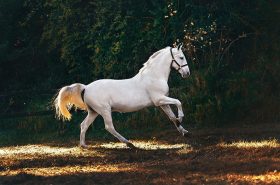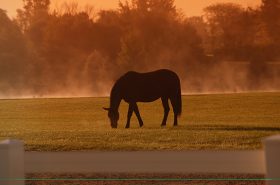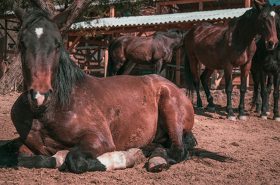Why is your horse stressed? Here’s what you need to know!
Stress, it’s everywhere! Horses (and even people) can feel it on a daily basis. It’s a way to cope with various challenges that are presented. These ongoing trials can make your horse suffer physically and mentally. Horses usually exhibit certain indicators that they’re dealing with a stressor. In order to help them, you’ll need to learn how your individual horse reacts.
It’s important to identify when your horse is stressed, to what level it’s affecting them, and how you can help control the situation. Factors like heavy training, extreme weather, their diet, and immune health can all influence their short- and long-term stress levels. You should also be mindful of where the stress is coming from.
Types of Stress
Behavioral
Your horse experiences the world in a different way compared to people. Their flight or fight response is much stronger than ours. More often than not, your horse’s flight response will send them in a panic. It can cause them to spook easier. When your horse is dealing with stress, their behavior will shift.
Some horse may exhibit signs of agitation, such as a swishing tail or ears flat back. Those that are lonely may exhibit depression and drop weight quickly. Some develop vices like weaving or cribbing. Try to identify what is causing this mental stress. It may be as simple as your horse needing a buddy.
Diet-Related
As you’re probably aware, your horse’s nutrition is extremely important. If their needs are not properly met, then your horse will begin to experience stress related to their diet. Your horse’s digestive system is designed to take in small, frequent meals. Ideally, this is done in a grazing environment. The bulk of their food should be in the form of forage with vitamins and supplements being added as needed. Constant changes to their feeding routine can also cause long-term stress.
Colic, laminitis, and tying-up can be indicators that your horse’s nutritional needs are not being met. Their body is under chronic stress. Your horse should be consuming 5 to 15 gallons of fresh water daily and 1-2% of their body weight in forage. If possible, feed several times throughout the daily, rather than once or twice. And lastly, when traveling make sure to bring food and water your horse is familiar with.
Physical
Structural injury or lameness can cause your horse to experience a greater level of anxiety. Heat, swelling, inflammation, and pain can lead to chronic stress. Some may show this through weight loss, gastric ulcers, behavioral problems, and trembling or sweating. It’s important you consistently check your horse over for injuries.
Performance horses and those in rigorous training may experience exercise-induced stress. Their body may not be able to handle their training or competition schedule. Make sure these horses are receiving the proper amount of time off or rest days.
And lastly, pregnancy can cause a type of physical stress. Your mare may become uncomfortable because of the physical changes she is going through. The actual birth may also be stressful. This short-term stressor can be seen through her pawing or pacing. Medication after the pregnancy may be necessary if the pain and discomfort continues.
Immunological
When your horse’s health is jeopardized through a disease or parasite they will typically experience stress. It can be as minor as feeling uncomfortable or as extreme as death. It’s essential you develop good management practices to ensure their well-being. This can include establishing a parasite control program, field rotation, proper manure management, and treating all the horses on the property at once.
It’s hard to completely eliminate stress from your horse’s life, but you can learn how to reduce and manage it better!
**
Emily Fought discovered her passion for horses early on in life. When she isn’t writing about them, you can find her in the barn riding. Although Emily’s background is in dressage, she enjoys cross-training and is an avid trail rider. She resides in Northwestern Pennsylvania with her husband and small dog. Together, they own and operate Humblewood Farm.




